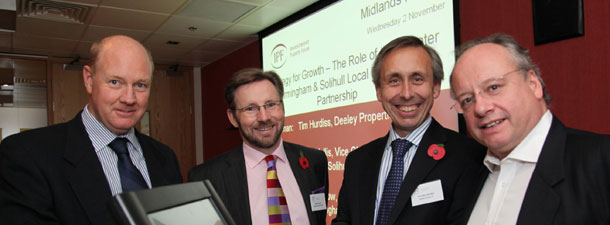Birmingham must become one of the easiest places to do business in the world, according to Mark Barrow, strategic director of development for Birmingham City Council.
And he told a meeting of the Investment Property Forum, held at the offices of law firm Cobbetts, that the Greater Birmingham and Solihull Local Enterprise Partnership was intent on doing just that.
“Someone said recently that if we are going to fail then let’s fail big – I agree with that. We must aim high.”
The likes of the New Street Station redevelopment, the airport extension, highway and lighting improvements, the Library of Birmingham, a programme of solar cells on the roofs of council houses, Eastside, the Enterprise Zone and High Speed 2 totalled a possible £6.68 billion.
In addition plans were well advanced for a £400 million bond to be launched on the money markets next spring.
Discussions were taking place with the European Investment Bank and various sovereign wealth funds.
It was hoped the capital assets of the city council could be worked much harder.
And a big inward investment push saw talks taking place with Jaguar Land Rover, aerospace group Rolls-Royce and the pharmaceutical sector about bringing more of their supply chain to the West Midlands.
“We are looking to lead the UK in becoming a ‘smart’ city – the creative industries, digital games and a world class digital infrastructure,” said Mr Barrow. “We want to see more advanced manufacturing, a transformed transport system and green investment.
“The 19th Century was the age of empire; the 20th Century was the age of nations; the 21st Century will be the age of cities.”
Never before in recent times, he claimed, had Birmingham had such influence nationally or with government ministers.
Steve Hollis, LEP vice chairman and Midlands chairman of accountancy firm KPMG, told the meeting that though the organisation had no cash ultimately what mattered was engagement and delivery.
“There is the potential for some big strategic investments in this area which will generate a lot of employment.
“We need Victorian style ‘game changers’ like HS2 and we need lots of people thinking about how we can do that.”
Similarly, Birmingham had to attract the big property players who could produce £200-300 million schemes.
“Secretaries of State want us to deliver big shiny things – they want good news stories from outside just the South-east. We need more of them.”
But he warned that something had to be done to tackle the 200,000 young adults in the West Midlands who were unemployed and with no skills. “Jaguar Land Rover wants 5,000 new engineers, but there is a dearth of that kind of talent. So the danger is we will see posters going up for JLR engineers in the likes of India, Poland and elsewhere.”
And he warned that Whitehall bureaucracy remained a barrier to the region being given the sort of devolved powers it needed to shape its own future.
The target was to create 100,000 new jobs, perhaps more. And that was achievable.





















